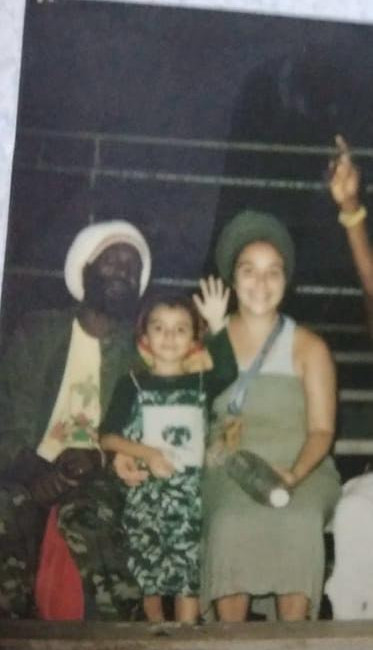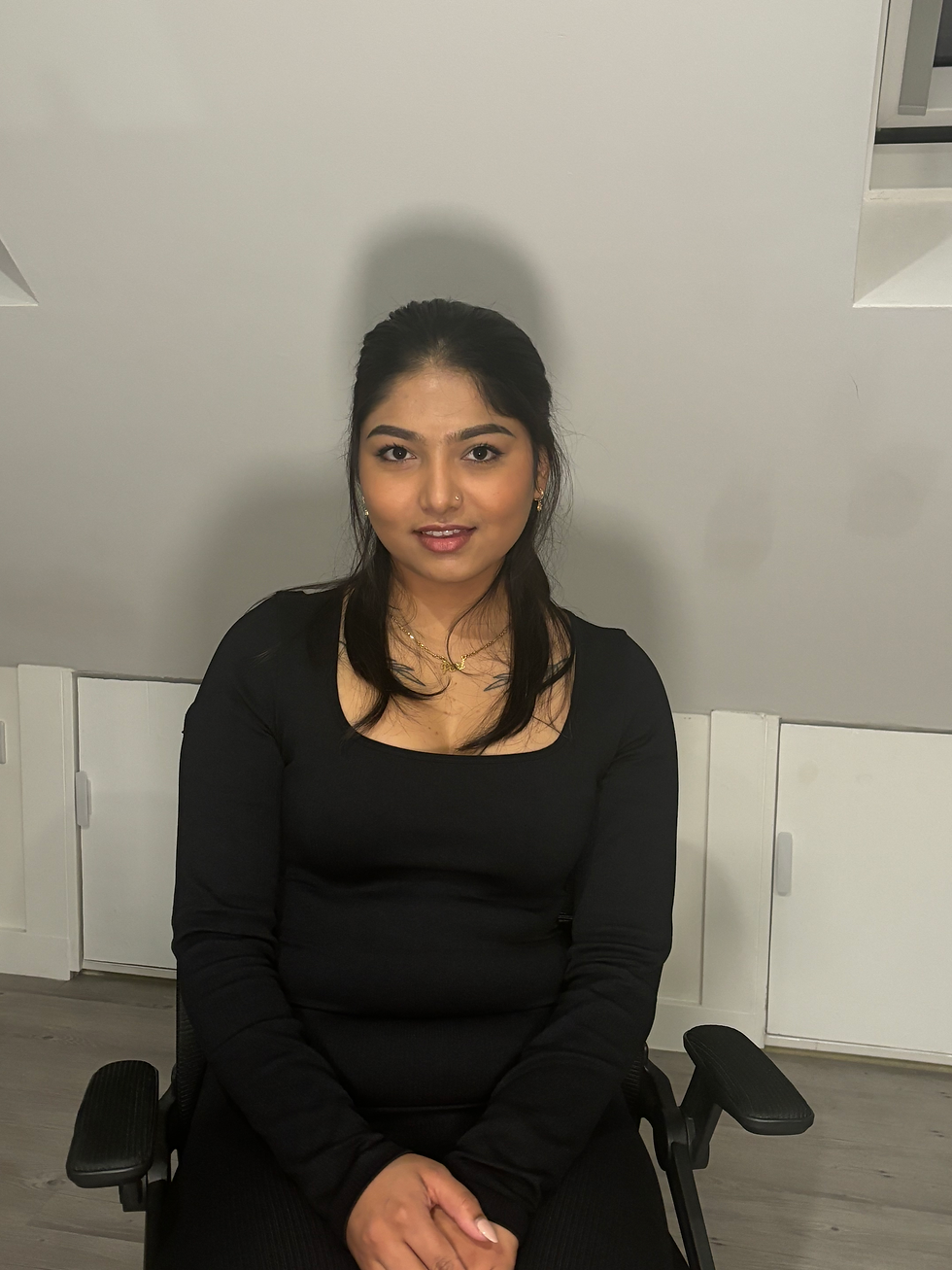Sky’s Story
- Utku Huseyin

- Nov 10, 2024
- 5 min read
Updated: Dec 16, 2024
At 24, Sky Caesar’s life tells a story of journeys across countries and cultures, shaped by her family’s rich and layered heritage. Born in Canada to parents of Guyanese and Italian-Argentinian descent, Caesar has grown up bridging worlds, from the Caribbean to Europe, each place leaving its mark on her identity.
Caesar’s early years were spent journeying through various countries, feeling at home in multiple cultures. “We’ve always travelled a lot,” she says. By age nine, her family moved to the UK, seeking opportunities and the promise of stable work after finding that her father, despite his qualifications as an English teacher, was unable to secure employment in Italy. A reality many immigrants face, amplified for him as a dark-skinned man. Reflecting on the choice her family made to move, she says, “It was either the UK, Germany, or Belgium. They went with where they thought the better work opportunities were.”
Life in the UK is a mix of appreciation and apprehension for Caesar. “I have a love-hate relationship with the UK,” she says. She values the opportunities available, from government-backed training and free courses to mentoring schemes, bursaries, and scholarships, support systems she acknowledges are rare in many other countries. Yet despite these advantages, she admits to a restlessness, feeling that the UK may not be her final destination. "Honestly, it feels like I’m waiting to find a better country to move to,” she says, describing a longing that persists.
As a young child, Caesar had little preconception of what life in the UK would be like. She recalls a pendant her father used to wear, fashioned from a UK 10p coin, “back when we’d never even stepped foot here,” she says. Only years later, upon arriving, did she realise what the coin symbolised. “That’s how little I knew about this place,” she laughs. At nine, during her first visit, she was initially captivated by the richness of central London. But as time passed, the landmarks mattered less; what she wanted most was something universal to any child: “I just wanted to make friends.”
Despite being uprooted, Caesar remains deeply connected to her heritage. Technology became a lifeline for maintaining ties with extended family across time zones. “Skype, and later WhatsApp, became crucial for staying connected with family,” she says, especially as travel costs made visiting relatives expensive. Still, the essence of her background was woven into everyday moments at home. The rhythms of Caribbean music echoed through her family home, as each year, the family celebrates Kwanzaa, dressing in bright colours and wrapping their hair, “like we would in the Caribbean.” Caesar also spoke Spanish and Italian with her family, passing down the languages to her younger siblings to preserve those ties.
In her work in film production, Caesar has had to adapt to the UK’s culture of formality, particularly the overly polite tone of emails. “People communicate in such in-depth, articulate ways, it can be a bit much at times,” she reflects. The coldness of daily interactions also feels alien compared to the warmth of her Caribbean and Italian experiences, where casual conversations with neighbours are common and outdoor spaces like plazas invite interaction, Caesar finds the UK to be more reserved. “In places like Italy or the Caribbean, you go outside, chat with your neighbours, and everyone speaks with everyone,” she explains. “But here, people only speak to some people.” She recently tested this cultural difference when returning from Glastonbury, attempting to say “good morning” to everyone she crossed paths with, only to be met with silence. “In Glastonbury, everyone responded—‘Good morning, how are you?’—but here, nobody did. I guess the experiment failed,” she laughs. Caesar admits that this coldness, often tied to the UK's busy lifestyle, is a challenge for her. “It’s something you have to get used to in production, but it’s not something that comes naturally to me,” she says.
Beyond communication, Caesar also struggles with British pub culture, which she feels is central to socialising and networking. While she understands that for many, the pub is a place of balance between work and relaxation, she doesn’t enjoy it. “That’s where most of the networking happens, but for me, it’s like I have to put up a front,” she explains. It’s an experience she’s not alone in but still finds it challenging to embrace fully.
Caesar’s experience with racial ambiguity has been complex. Her appearance often subjects her to stereotypes, especially from those unfamiliar with her mixed background. The portrayal of people like her in UK media often feels reductive or dismissive. Reflecting on the portrayal of her Caribbean heritage, she recalls a recent Bob Marley stage play, “It felt mocky and a bit violent, it was very inaccurate and not at all respectful.”
While the Italian side of her background escapes much of this scrutiny, Caesar is especially sensitive to the way Black Caribbean people are depicted. This has driven her ambition to work in film and television “One of the main reasons I wanted to work in this industry,” she shares, “is to write better stories about mixed-race and mixed-heritage people, but also people of colour.” Time and time again, she finds herself let down by so-called “good representations” that feel inauthentic. “Nine times out of ten, I’m disappointed,” she says. “I think it’s damaging in some aspects.” For her, if more diverse, real stories were told, it would open up new creative possibilities across film and television, “Reality influences fiction, and vice versa.”
Growing up mixed-race has brought both privileges and challenges. Caesar’s racial ambiguity has, at times, shielded her from overt discrimination, but microaggressions persist, especially for her family members with darker skin tones. “Most of the time, it’s curiosity, and I don’t mind curiosity,” she says. “I’m proud and happy to explain about all the differences.” Yet, there are moments when these interactions cross a line, with “little jokes that you brush off, but they still sting,” she admits, referencing comments about her food or accent. She recalls the unsettling moment when her Black South African friend was searched outside a club, a sharp reminder of the subtle yet pervasive nature of discrimination. “It’s just simple things like that. You don’t think about it but just feel disgusted in that moment,” she says.
Caesar longs for a media landscape that amplifies diverse voices. “I’d love to see a world where everyone’s story is being told,” she says, though she acknowledges it won’t happen overnight. “Can you imagine how much more fun our films and TV shows would be if we saw stories from someone like you, someone like me, and all the in-between?” Her vision is simple yet powerful, a world where every background is seen, and every story is told.







Comments